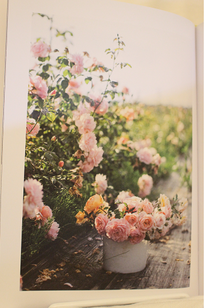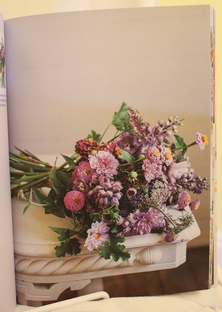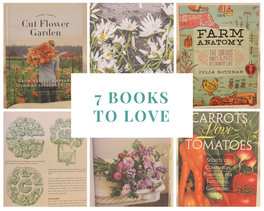 Garden, flower and farm books help me determine what my ultimate dream garden looks like, what will work best for my land, and what new plants I should buy. I’m bibliophile and reading about gardens and learning new techniques stirs my soul and makes working outdoors that much more fun. I tend to gravitate towards books that provide specific information on topics that I’m passionate about like garden design, organic practices, urban farming, edible gardens and herb and flower books. Here are a few books that I’m reading right now to gain inspiration: 1. Floret Farm’s Cut Flower Garden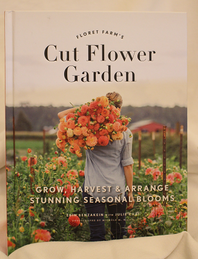 Floret Farm's Cut Flower Garden Floret Farm's Cut Flower Garden After stumbling on Floret Farm’s website, I immediately bought their book Floret Farm’s Cut Flower Garden on an impulse. As I plan out my urban farm, I realize that while I want to grow enough vegetables for our family, my real desire is to plant pollinator flowers, wildflowers, and other cut flowers. I also realize that although there are a few urban farms in the area, there is no farm that specializes or sells flowers or herbs. This direction is an epiphany for me -- I needed to hone my focus a bit more, especially with my limited land space. The moment I opened this book I realized that I made the right decision in purchasing it. The visuals in are stunning and well-designed. It was like looking through an Instagram feed of the most glorious blooms. But there are also lots of practical tips for beginning flower farmers including how to design a plot, how to maximize your space, caring for cut flowers, which specific flower species are going to be most successful for a flower farm, and so much more. It’s so hard to describe this book as the pictures are what brings it to life, so I snapped a few pics: Each flower photograph has been painstakingly staged, thematically prepared, labeled, and positioned in the book with thoughtfulness. Whoever designed this book is a genius, and makes me realize this is the kind of farmer, and author, that I aspire to be. I’d put this on the top of your list if you are interested in growing flowers for profit. 2. The Chef’s Garden’s Mother’s Day LookbookI found this lookbook via Twitter a few days ago. It’s The Chef’s Garden’s Mother’s Day lookbook (here’s their website). For those who have never heard of a lookbook, it’s a storybook primarily made of visuals to showcase a collection and to provide a perspective on a moment in time. I’ve seen trendy boutiques and up and coming businesses do this, but never have I seen a farm do this. I love how they incorporate edible flowers and herbs into an elegant menu and the clean way they display their products on a stark white background. The brand aesthetic comes through clearly and makes me reimagine what’s possible in the garden, on the table, and at restaurants. The Chef’s Garden is a master at their craft, which is always a beauty to behold. And all this work, for one brunch event? They can make mothers everywhere feel appreciated. 3. The Urban Farmer: Growing Food for Profit on Leased and Borrowed LandI recently read The Urban Farmer: Growing Food for Profit on Leased and Borrowed Land. Rather, I listened to the Audible book, so does that count as reading it? Truthfully, I find audiobooks easier to consume as I can listen while I’m outside doing chores in the garden, or in the car, or in the morning when I’m getting ready for the day, you get it. Audiobooks are convenient. This book had a lot of good info that I wanted to go back and read through (or listen to) again. One awesome thing about this book is that the author took the time to provide “free extras” of the things he was explaining in the book, which are downloadable assets you can get from the website. If you are looking to brush up on your business operating skills, and want to know more about maximizing profits, record-keeping best practices, and how to build relationships with landowners to use their land for growing things, this is the book for you. It hit me that if you aren’t a good record keeper, and you don't organize your sales or purchases, you need to learn these skills quick if you want to be a profitable urban farmer. You also need to learn these skills to optimize the products that you take to the farmers market or sell to chefs. Bottom line if you are looking for an entry-level business book to help you start an urban farm, I’d recommend this one. For deeper learnings, you can always take a college course, reach out to your university extension, etc. 4. Farm Anatomy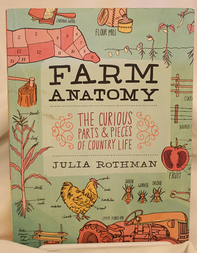 Farm Anatomy Farm Anatomy Farm Anatomy is not a traditional book. Rather it’s more of an illustrated library of farm life, separated into sections like “breaking ground,” “tools of the trade” and “plant a seed”. There are awesome instructions on everything from how to build a bean teepee, how to plant an apple orchard or even how to milk a cow. Farm Anatomy is the perfect book if you appreciate illustrated art, want to know more about farm life, or as a gift to a child who loves nature and wants to know more about the world. I’d also recommend Nature Anatomy which has accompanied me on many nature walks. It’s the type of book you’d want to cut pictures out of and frame them for a nursery or child’s playroom. So cute! 5. Gaia’s Garden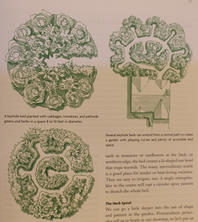 Gaia’s Garden - A Guide to Home-Scale Permaculture Gaia’s Garden - A Guide to Home-Scale Permaculture I rush ordered Gaia’s Garden - A Guide to Home-Scale Permaculture after reading about it on another blog. I was turned onto this book initially because of their non-traditional garden plan layouts. I love the beauty of an herb knot garden, a hedge maze, a labyrinth garden or mandala garden. From a visual perspective, Winding paths, slightly-wild cottage gardens, and beautifully planned outdoor living spaces attract me, rather than the straight clean lines of row after row of farm crops. For me, that straight row aesthetic seems stale and sterile, and it doesn’t maximize limited space and jive with intensive gardening practices. Here are some favorite designs from this book, and there are many! 6. Carrots Love Tomatoes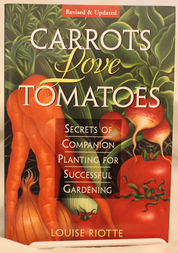 Carrots Love Tomatoes Carrots Love Tomatoes I was looking for a newer version of Rodale’s book (mentioned below) when I stumbled on Carrots Love Tomatoes: Secrets of Companion Planting for Successful Gardening. I wanted to dig into companion planting more, and this is a great book to help novice to intermediate gardeners understand what plants grow well with others. I read this cover-to-cover on a long winter weekend, and I learned several new tips along the way. French intensive gardening practices and old-school interplanting techniques are not as common knowledge today than they used to be; it’s almost a lost art that our industry is rediscovering. This garden book is a great quick reference guide to refresh your memory on what plants work well with others. The book would also be a great gift for novice gardeners, just starting out and traditional gardeners, that don’t know much about organic gardening practices. 7. Getting the Most from Your GardenI have an old copy of Rodale’s “Getting the Most from Your Garden” that I picked up at a garage sale years ago. My 1980 version might not have the newest tech advances, but it is a veritable bible of information on intensive gardening, companion planting, organic practices, double digging, designing a bed, extending your season, seed starting and transplanting and so much more. I have read many books since I picked this one up, and many of the popular books out today echo the good practices already laid out in this book, although with much less information supplied. This book will be handed down in my family as one of the must-reads before starting a garden, but take note: I consider it as more of a textbook than a leisure book, it’s very dense and has few pictures, so you must be very into gardening before picking this one up. Those are just a few of the books that are on my shelves. I tried to pick a good variety that would provide something for everyone. Hopefully, you’ll find something on this list to love and share, just like I did. Please feel free to comment if you have a favorite book you’d like to add, or if you are an author yourself, let me know, and I’d be happy to read your book and provide a review.
Comments are closed.
|
About UsThis is a blog about turning lawns into edible gardens, providing a habitat for pollinators and living a more sustainable life. We hope to inspire others to plant a garden to save the world. CategoriesArchives
September 2018
© Copyright 2018 Wildflower Lab
|

